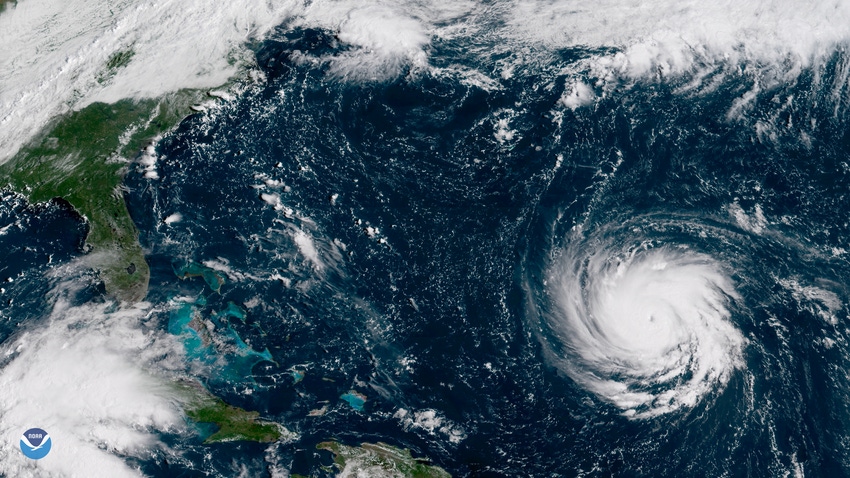Hurricane expected to strengthen to near Category 5 levels over next 48 hours.

Hurricane Florence, already classified at Category 4, is expected to strengthen over the next 48 hours as it bears down on the Carolinas. The governors of both South Carolina and North Carolina have declared a state of emergency, and agricultural producers, particularly livestock producers, all along the East Coast are preparing operations.
The National Hurricane Center (NHC) reported Sept. 11 that additional strengthening in Florence is expected over the next 48 hours, possibly bringing it near Category 5 levels within the next 24-36 hours.
“After 48 hours, a slight increase in southwesterly shear could result in some weakening, but Florence is expected to remain an extremely dangerous hurricane when it approaches the U.S. coastline,” NHC reported.
In addition to declaring a a state of emergency, North Carolina Gov. Roy Cooper also waived transportation rules to help farmers harvest and transport their crops more quickly.
“While it’s still too early to know the storm’s path, we know we have to be prepared,” Cooper said. “During harvest, time is of the essence. Action today can avoid losses due to Florence.”
The governor’s actions temporarily waive the cap on maximum hours-of-service restrictions for trucks and heavy vehicles traveling in and through North Carolina and size and weight restrictions for trucks carrying crops and livestock.
Farmers will be able to gather and move crops in and through the state more easily and quickly in response to problems that could be caused by the storm.
North Carolina agriculture commissioner Steve Troxler released a statement expressing his appreciation that Cooper issued a state of emergency for the state.
“Although this storm may change course, we are monitoring the situation closely and are working proactively because of the amount of crops still in fields. We urge everyone to take this situation seriously and take precautions as the storm moves toward North Carolina,” Troxel said.
Hog, chicken producers prepare
Smithfield Foods Inc. announced Tuesday that it is fully prepared for the potential impact of Hurricane Florence, specifically in North Carolina and Virginia. Smithfield has numerous operations -- both facilities and farms -- and more than 14,000 employees across both states and has initiated its hurricane preparedness procedures.
Employees in the company's eastern Virginia and North Carolina plants and on its approximately 250 company-owned farms and 1,500 contract farms are taking steps to protect people, animals and buildings against wind and rain damage, Smithfield said.
On its farms, the company has been closely monitoring and, as necessary, lowering lagoon levels in accordance with state regulations and farms' nutrient management plans and encouraging its contract growers to do the same.
“The safety of our employees is top of mind, and we will continue to actively monitor the storm's track and adjust production schedules accordingly,” said Keira Lombardo, Smithfield Foods senior vice president of corporate affairs. “We will also remain in constant contact with state emergency and regulatory personnel throughout the event.”
Delmarva Poultry Industry Inc. (DPI) is emphasizing that chicken growers everywhere prepare now for the possibility of heavy rain and damaging winds.
Steps chicken growers should take now include:
Check the operating condition of your backup generators and ensure adequate fuel and filter supplies for several days of operations. Make sure automatic starting systems are ready to go.
Make sure there is adequate propane gas on the farm, and arrange an earlier-than-normal delivery, if necessary.
Check your feed inventory, and notify the chicken company if there is reason to believe that a delivery will be needed before the next normal delivery.
Make sure cell phones are fully charged, and have rechargeable battery packs on hand in case landline telephone service is lost.
Secure outside objects on your farm — signs, tools, boxes, etc. — so they don’t blow over or blow away and cause damage.
Check the security of roofing materials, chicken house siding and windows and doors to make sure they will not blow off or blow open. Corners and edges of buildings are particularly vulnerable.
Be sure drainage ditches are free of debris and are adequate to move large volumes of water away from the chicken houses.
Be prepared to keep birds longer than normal in case processing plants are unable to operate.
Be sure all equipment like tractors and skid loaders are fully fueled.
Put important documents into waterproof containers.
Have cash on hand, since some merchants without electricity might not be able to process credit and debit cards.
DPI said if there is no electricity whatsoever, house conditions will need to be monitored more frequently, and adjustments will need to be made as needed.
Additionally, if strong winds knock down trees, DPI said to make farm lanes and houses accessible to delivery vehicles as soon as it is safe to do so.
Since the track of the hurricane is still unknown, the Virginia Department of Agriculture & Consumer Services advised farmers to take precautions to help protect their families, farms and livestock.
“Farms are asset-heavy with expensive buildings, equipment, animals and other tools of the trade, so taking precautions today may save thousands of dollars in property loss,” said Jewel Bronaugh, commissioner of the Virginia Department of Agriculture & Consumer Services.
About the Author(s)
You May Also Like

.png?width=300&auto=webp&quality=80&disable=upscale)

